The Enduring Legacy of Violent Conflict
A Report on the Europe’s Futures Project Study Visit to Ireland and Northern Ireland
The current Europe’s Futures Fellows enjoyed a visit to Ireland and Northern Ireland, 15-19 April 2024. It was an immense honor to have them here – and a timely one. Ireland is at something of a hinge point in terms of its democratic constitution, as testified by both the shocking rise of anti-immigrant violence and rising expectations of Irish unification post-Brexit. There is a strong sense in both jurisdictions on the island that liberal democracy is under pressure.
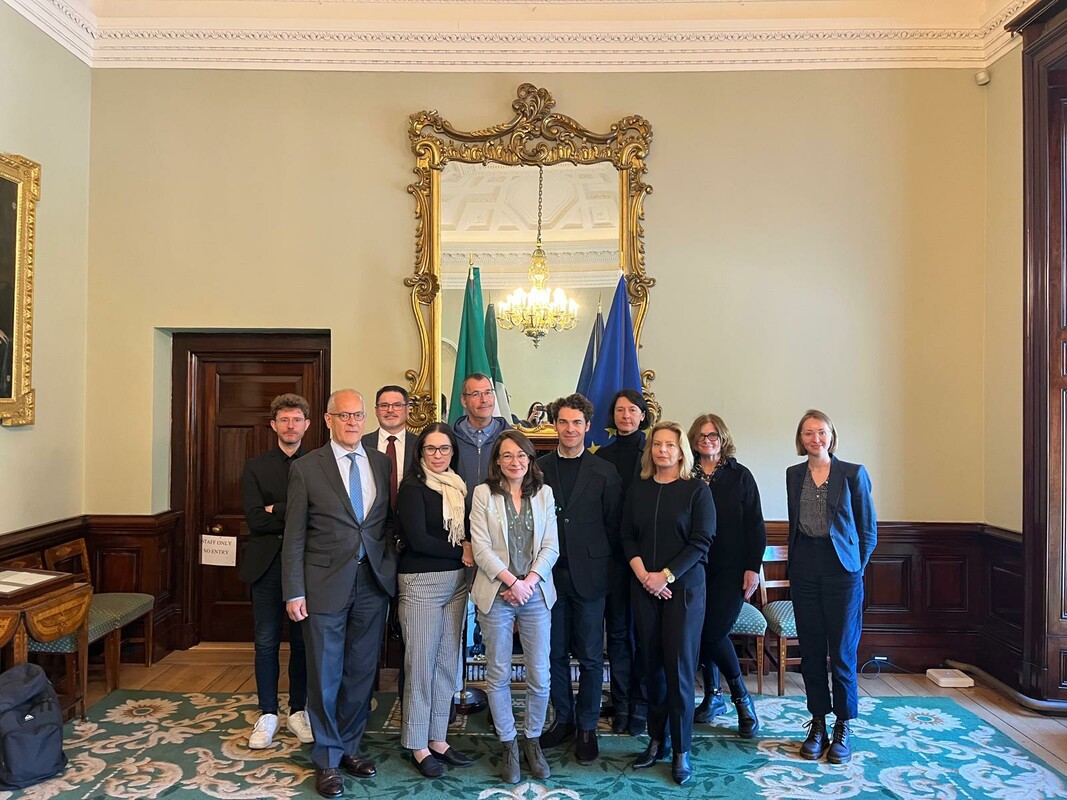
Department of Foreign Affairs (DFA), Iveagh House
With this in mind, I was determined to offer a program that would enable meaningful exchanges of ideas and insights among the group (which, wonderfully included Ivan Vejvoda, Hedvig Morvai of the ERSTE Stiftung, and Misha Glenny – not to mention Felix Filnkössl, who made the whole thing run smoothly), as well as exchanges between them and a variety of interlocuters across the island.
The program began on Monday evening with an informal dinner with views over the city and views exchanged with guests Shelley Deane (University of Notre Dame), an expert in institutional transitional reform, and the columnist and author Fintan O’Toole (Irish Times, Princeton University), one of Ireland’s leading public intellectuals. One of the Fellows happily remarked afterwards how unpretentious Irish people can be; certainly that openness was a characteristic that we benefited from over the coming days, as local speakers and audiences alike made the most of the opportunity to engage in honesty and sincerity with the visiting group.
The next morning we were hosted by the Department of Foreign Affairs (DFA) in their splendid Georgian building, Iveagh House, located on St. Stephens Green. The opening remarks were made by Sonja Hyland, deputy Secretary General of the DFA, who explained Ireland’s distinctive foreign policy responses to collective challenges. This was followed by a session titled ‘High-level diplomacy and low-level conflict’ with Ciarán Madden and Ellie Farrell from the Northern Ireland (NI) division of the DFA. In many ways, they set the context for much of what followed, with their emphasis upon the bedrock of the 1998 Good Friday (Belfast) Agreement, the failure to reconcile communities so far, the invaluable role of civil society organizations, and the continued importance of dialogue both intergovernmental and intercommunity.
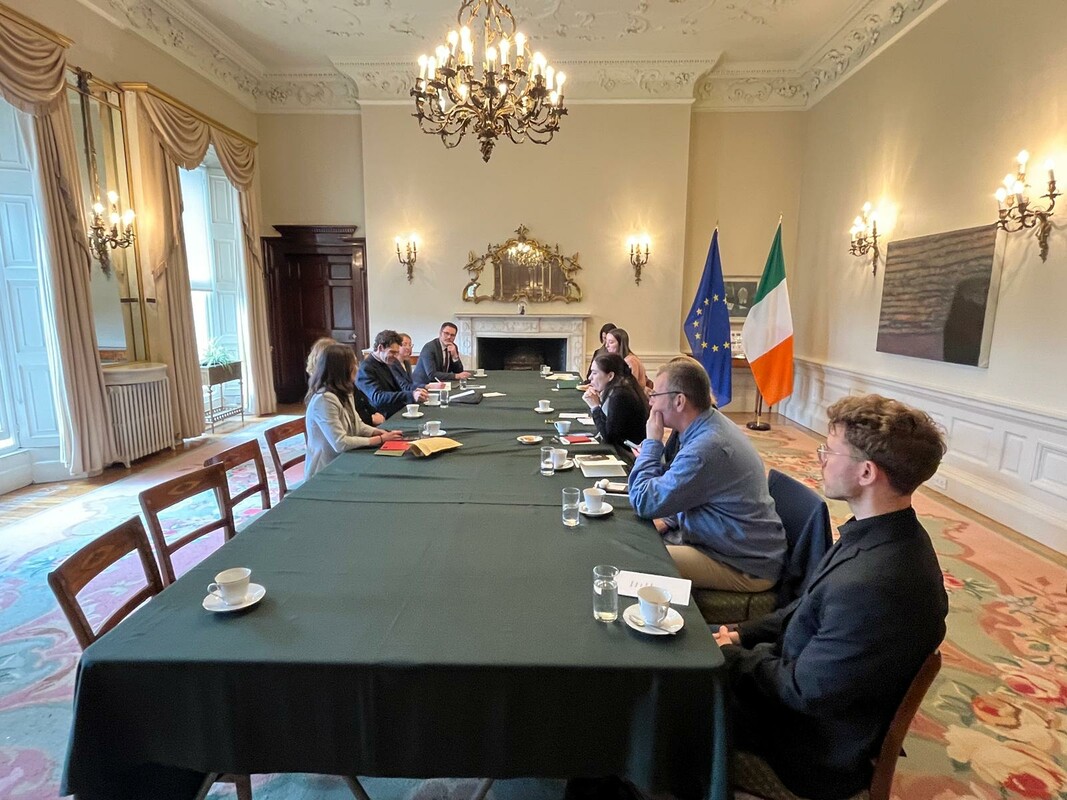
The third session of the morning was on the subject of participatory democratic methods, for which Ireland is internationally renowned. We were privileged to have the insights of Professor Jane Suiter (Dublin City University) who was one of the innovators behind Ireland’s first deliberative experiment in 2011, and Cathal O’Regan (Department of the Taoiseach) who was the Secretary for Ireland’s most recent Citizens Assembly on drugs use. Together with contributions from two Fellows, Ieva Česnulaitytė and Alberto Alemanno, it was an illuminating practitioner/expert discussion of what can be done when politicians fear that they ‘no longer understand what the voters want’ – as well as a reminder of the need to handle such methods responsibly and with care.
After lunch in the National Concert Hall, we caught the train in Connolly Station to Belfast for a journey which passes along Ireland’s eastern shoreline and then up through the Mourne mountains. Crossing the Irish border was made most apparent by the sudden end of the mobile roaming service – the first tangible sign of the impact of Brexit, a topic which would be raised a lot over the coming days.
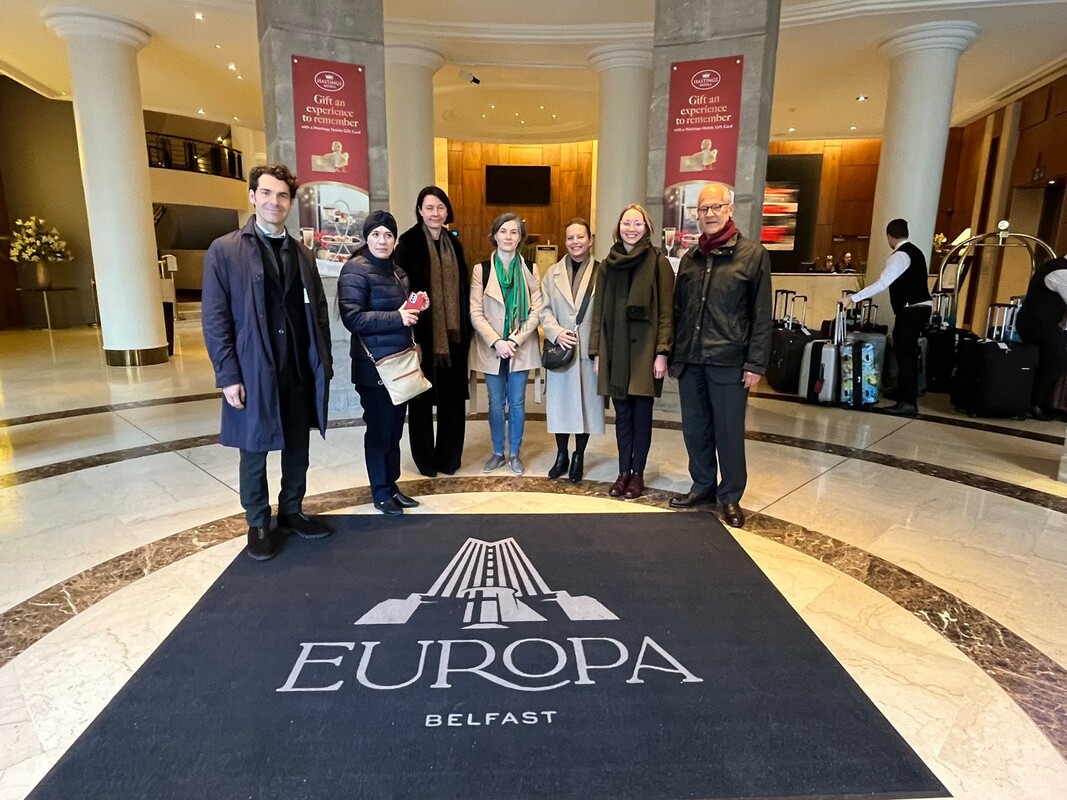
The Europa Hotel Belfast
Dinner on Tuesday, in a cozy upstairs room of a traditional Irish restaurant, was with Jim Fitzpatrick, an investigative journalist working with OCCRP among others, and Declan Lawn, who was receiving glowing reviews of the second season of Blue Lights (the BBC drama he co-wrote and produced) which had aired the previous evening. Jim and Declan were generous in sharing stories from their experiences of the Troubles as well as explaining its continued impact today, not least in the form of the challenges faced by the police service and the inadequacies of the political system.
The enduring legacy of violent conflict was very apparent the following morning, when we went on a guided tour of the so-called ‘peace walls’ in West Belfast, in appropriately overcast weather. Our guides were former paramilitary prisoners, with the Irish republican swapping with the loyalist guide at an interface between two segregated communities. The sights as well as the narratives of the tours were a powerful testament to enduring division: the memorialization of perpetrators as well as victims of violence, the fourteen-meter-high metal walls cutting across and behind streets, and the neglected, deserted sites which had once been places of industrial and social activity.
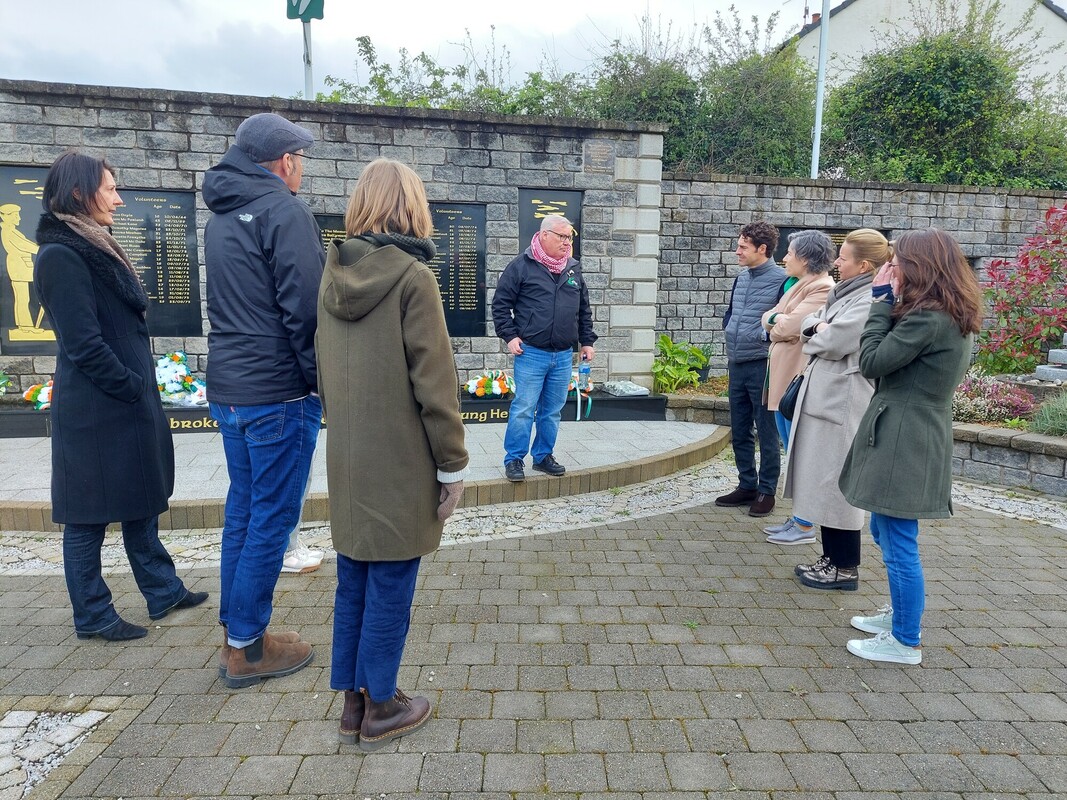
Coiste Irish Political Tours, Ballymurphy Memorial Garden
In deliberate planning, the session that followed was completely different in spirit and tone: a roundtable with women leaders of grassroots organizations from different communities in Northern Ireland. Eileen Weir (Shankill Women’s Centre), Elaine Crory (Women’s Development Resource Agency), Ivanka Antova (United Against Racism), Avila Kilmurray (Social Change Initiative), Louise Coyle and Charmain Jones (NI Women’s Rural Network) shared camaraderie as well as stories regarding the type of challenges they face in their tireless efforts to meet the needs of the most vulnerable. They explained why the work of civil society organizations continues to be quite so crucial in NI, with illuminating insights into the limitations of the peace process. The sense of solidarity among all present in the room was striking. One speaker wrote to me afterwards,
"I am so pleased the delegation found our session useful; our sector colleagues always power me on and I am delighted the visitors could see how important that is to our collective work... I was so grateful for the opportunity to connect in solidarity with everyone else, whilst not the purpose of our meeting, for me it was very much needed."
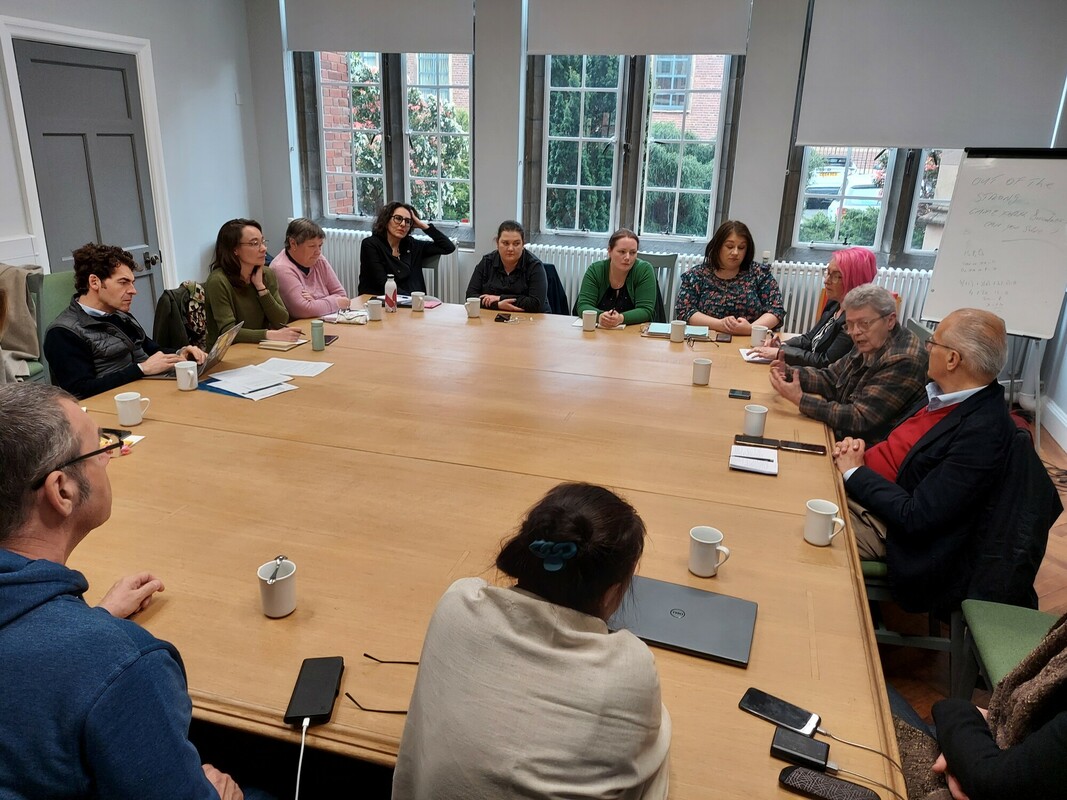
Roundtable with grassroots activists at Queen’s University Belfast
After an afternoon free to explore the city, we reconvened in the headquarters of the Irish Secretariat in Belfast – the base of the DFA in Northern Ireland. Co-hosted by Glenn Patterson of the Seamus Heaney Centre, the conversation between Misha Glenny and Fellow Vladimir Arsenijević drew an enthusiastic audience of students, those from the artistic community, and (I’ll be honest) lifelong fans of Misha Glenny. They weren’t disappointed! Vladimir’s striking account of how conflict emerged in his home place – and how “only a fool like me in 1989 could believe it wasn’t going to happen” – absolutely gripped the audience. We listened very conscious not only of some parallels between violent conflict in the former Yugoslavia and Northern Ireland but also of the lingering menace of the same. A member of the audience wrote to me afterwards:
"Well, wasn’t that great? I am so grateful for the invite to last night’s event. What a pleasure it was to listen in on that conversation… it was all fascinating stuff."
None of us locals can forget Vladimir’s answer, when asked about his impressions of Belfast and whether the conflict is fully over: “If it was finished, it would look different”. Conversations about what remains unfinished in peace continued into the evening over a dinner generously hosted by the Irish Secretary, Laurence Simms and his wife, Emma Madigan, also an Irish diplomat.
The final day of the program began at Queen’s University, with a panel discussion on the subject of ‘What to preserve in times of crisis and how?’ co-hosted by the Senator George J. Mitchell Institute. Prof Alister Miskimmon chaired Ivan Vejvoda and Fellows Kadri Liik, Hanna Shelest and Karolina Wigura in a discussion that was both reflective and forward-looking. Ivan’s reminder that “the end of history can come back” was a perfect opening to a discussion covering how democracy and security can die in the psyche of a people, of the political and psychological consequences of such loss, and of how the ending of conflict is primarily a moral not a political question.
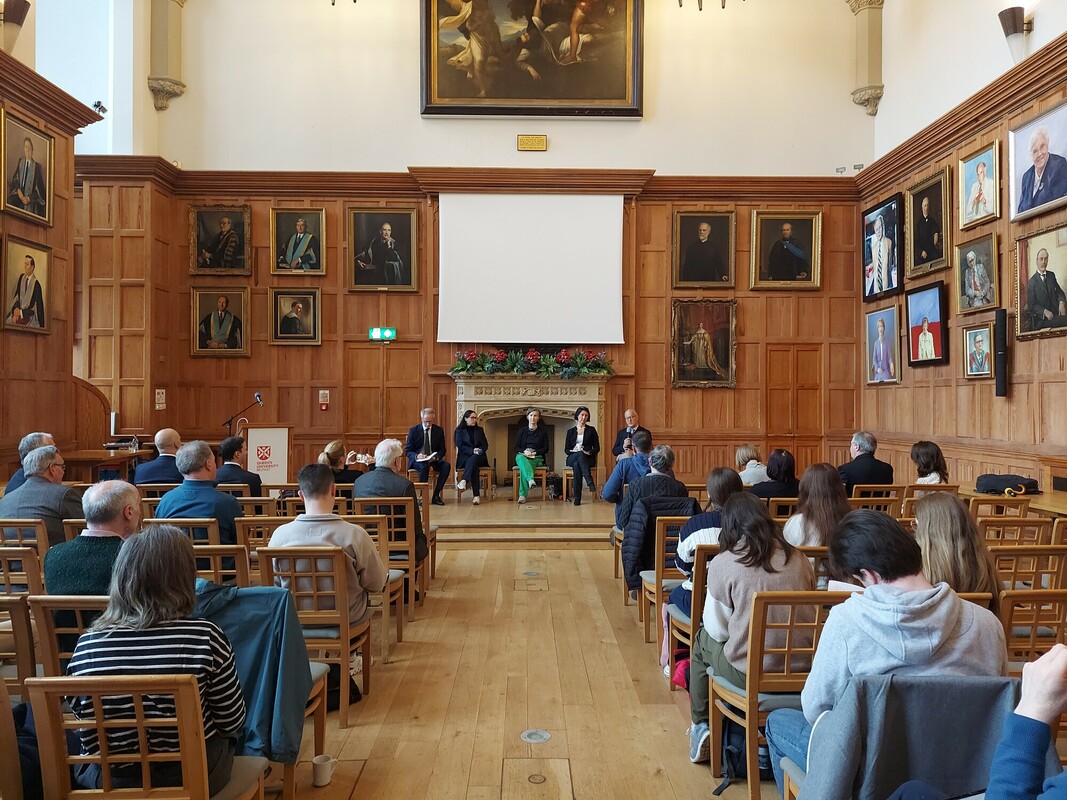
Panel discussion at Queen’s University Belfast
There were many questions from the large audience, from undergraduates to consuls general. Afterwards I received emails from some present, expressing their appreciation:
"I found last week’s event just excellent. Superb panel and a rich and varied range of perspectives and insights on a critically important topic."
"We don't have enough of these types of events on pressing European issues, so it was great to hold it. It was great to see the students turn up. I think there's a real appetite for events like this to help them understand and to allow them to debate the big issues facing us."
"It was really a great event and a great panel – a panel able to bring the very abstract (and because of that very powerful) concept of democracy down to people: our courage and lack of courage, our awareness and moments of ‘distraction’, the language and the narratives we use – and to do so through their own lived experiences."
And then we boarded a coach to take the scenic route to the north coast, with a quick stop at the imposing Carrickfergus Castle, from which the Norman conquest of eastern Ulster took place in the twelfth century and where, infamously, William of Orange first stepped foot in Ireland in 1690 changing the course of Irish history. The castle theme continued with a relaxed lunch at the tea rooms in Glenarm Castle. Unfortunately, the weather put paid to plans for any beach walks (let alone swims), and we were glad of the warmth as well as the warm welcome offered to us by Rev. Alex Wimberley to the Corrymeela Peacebuilding Community in Ballycastle.
Sitting in the lounge with views down the cliffs across the Irish Sea, our guests for the afternoon, Ziya Meral (SOAS, RUSI, European Leadership Network), an expert in global trends shaping security, and John McDowell (Archbishop of Armagh and Primate of the Church of Ireland) led us in a challenging, honest discussion, bringing together different perspectives and interpretations of what we had heard over the course of the program, including from each other.
After a meal with those in the Community, we returned to the lounge for final thoughts, at the end of the program, on what we will take with us as cause for hope. It is impossible to report on that without speaking personally. And I will forever remember that hour as one in which each of us was very aware of conditions that are frightening and intimidating; and yet what struck me was that none of us were afraid. There were so many reasons to hold onto hope, absent any sense of delusion; such reasons were embodied by the individuals in that room (from such different places and positions) and embraced.
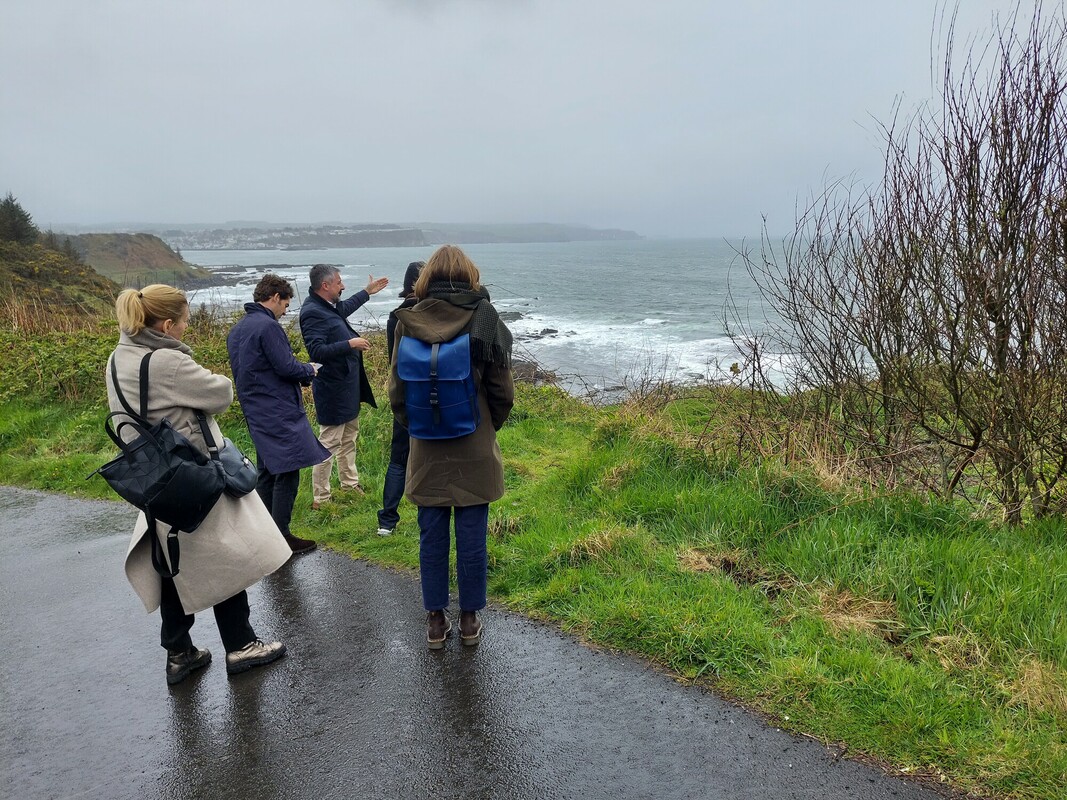
North Coast, Ballycastle
It would be remiss of me, though, to conclude this brief report with anything other than an acknowledgement that the program came to a worthy conclusion not in a place of retreat but enjoying the craic together in Belfast’s most splendid Victorian saloon.
Katy Hayward, Belfast
This publication represents the views of the author(s) and not the collective position of the Institute for Human Sciences (IWM Vienna) or the “Europe’s Futures” project.

